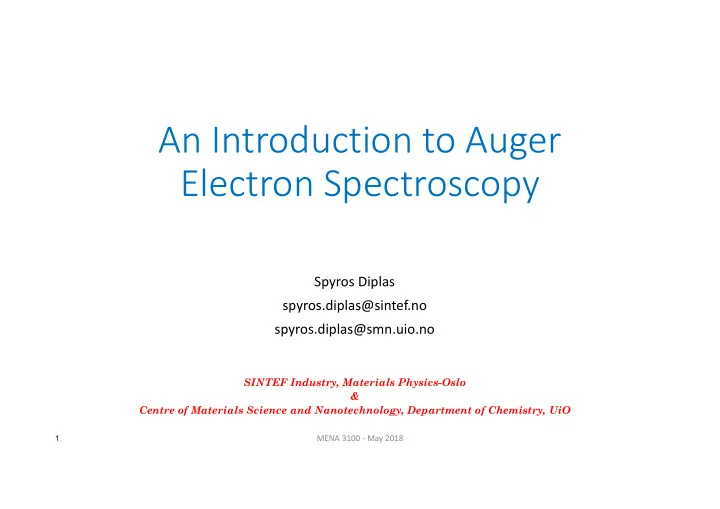

An Introduction to Auger Electron Spectroscopy Spyros Diplas spyros.diplas@sintef.no spyros.diplas@smn.uio.no SINTEF Industry, Materials Physics-Oslo & Centre of Materials Science and Nanotechnology, Department of Chemistry, UiO 1 MENA 3100 ‐ May 2018
Contents • Background • An Auger microprobe • The Auger process • Auger spectroscopy • Auger mapping • Depth profiling 2
The Auger process • Named after Pierre Auger • 1925 • Actually discovered by Lise Meitner • 1922 • Emission of an intial electron leads to the emission of a characteristic (Auger) electron. 3
Auger Electron Spectroscopy (AES) Signal Exciting radiation Electrons Electron beam (Scanning) (Spectrometer) UHV vacuum Analysis depth (typically a few nm) SAMPLE Auger emission E KL2,3 L2,3 ≈ E K – E L2,3 – E L2,3 E = energy of emitted electron E K = K‐shell ionisation energy E L2,3 = L‐shell electron energies 4
Auger electron vs x‐ray emission yield 1.0 Auger Electron Emission 0.8 Probability 0.6 0.4 0.2 X-ray Photon Emission 0 5 10 15 20 25 30 35 40 Atomic Number B Ne P Ca Mn Zn Br Zr Elemental Symbol 5
Auger ‐ lateral resolution 160 kX SEM 4 m at 20kV 0,1 m 2kV 160 kX Auger Maps n.b. much better than EDS in bulk samples 6
Auger Electron Spectroscopy The JEOL JAMP-9500F FE Auger Microprobe UHV Chamber FE‐SEM quality electron column nm‐scale depth resolution Depth profiling Basic Specification Additional capabilities: • 3nm SEI resolution EDS system • 8nm probe diameter for Auger analysis •”Bulk” composition analysis. • Variable energy resolution from 0.05% Backscattered electron detector to 0.6% •Atomic number contrast. • Chemical state analysis in several 10nm Heating stage areas •Diffusion experiments. • Ion gun for sputter depth profiling Liquid nitrogen fracture stage •Grain boundary and interface studies. Allows some charge neutralisation for analysis of insulating materials Electron Beam Induced Current (EBIC) •Recombination centre mapping in solar cells, etc. 7
Origin of Auger signal 2nd step: An Auger electron is emitted. The Auger electron is named after the shells involved in its generation. Here L 3 M 1 M 23 Internal transition: 1st step: An electron from M1 fills a hole in L3 Auger electron generation 8
Electron spectrometer Hemispherical spectrometers often used. Tend to be used in constant retard ration mode (CRR), as this supresses the strong low energy signal. Constant analyser energy (CAE) also has uses. Cylindrical mirror analyser used to be most common, still in use. 9
Auger spectrum ‐ typical It is quite common to deal with the differential form of the spectrum. 10
Chemical shift in Si compounds Comparison of Si, SiN x and SiO 2 11
Auger spectrum ‐ quantification Can use peak areas or peak-to-background ratios 12
Auger spectrum ‐ quantification Concentration of element N A is: N A = I A /(I A + F AB I B +F AC I C +....) I is the element intensity F is a sensitivity factor determined from binary standards such that: F AB = (I A /N A /I B /N B ) This is highly simplified but can work reasonable well. 13
Auger mapping Pixel-by-pixel, typically calculate; (peak-background)/background 14
Combined SEM/Auger analysis Carburised alloy 200nm 15
Combined Auger EDS mapping 16
Auger mapping of Si p and n type 17
AES – nm lateral and depth resolution Chromated aluminium alloy surface • Chromating pretreatment – corrosion protection – before coating, painting, bonding, etc • Does the chromate ”passivate” intermetallic particles? O 2 2 • Auger spectra show that the intermetallic particles 1 are covered by a thin layer 1 of Cr‐oxide that is invisible Cr metal in the SEM images. reference 430 450 470 490 510 530 550 570 590 Electron kinetic energy / eV 18
Depth profiling ‐ schematic Electron beam Argon ion gun Sample Process is fully automated, sample can be rotated (Zalar rotation). N.B. Can also perform angle-resolved analysis. 19
Depth profiling CeO 2 buffer layer 20
Potential Auger Applications • Conducting / semiconducting materials • Corrosion studies • Coatings • Depth profiling • Catalysis • Carbon/other material fibres • Metallurgy • Grain boundaries in steels • Can be extended to low conductivity materials • Use low energy ion gun to flood surface • Probably not polymers 21
Summary • Combine SEM and electron spectroscopy • High lateral and depth resolution • Chemical state information • Need to explore the possibilities • Depth profiling • ”Bread and butter” applicaion. • Segregation and interface studies • Surfaces and internal interfaces • Complementart with other techniques • XPS/TEM…… 22
References • Scanning Auger Electron Microscopy; M. Prutton and M. M. El. Gomati, Eds., John Wiley and sons, 2006. • Practical Surface Analysis by Auger and Photoelectron Spectroscopy ; D. Briggs and M. Seah, John Wiley, 1983 • An Introduction to Surface Analysis by XPS and AES; J. F. Watts and J. Wolstenholme, Wiley, Chichester, 2003. • Surface analysis by Auger and x‐ray photoelectron spectroscopy; D. Briggs, J. T. Grant, Eds.; IM: Chichester, 2003 23
Recommend
More recommend